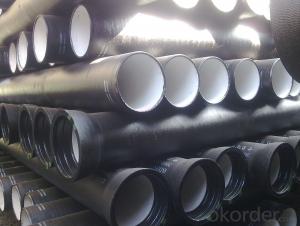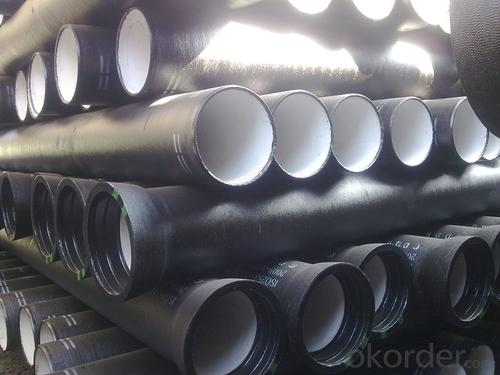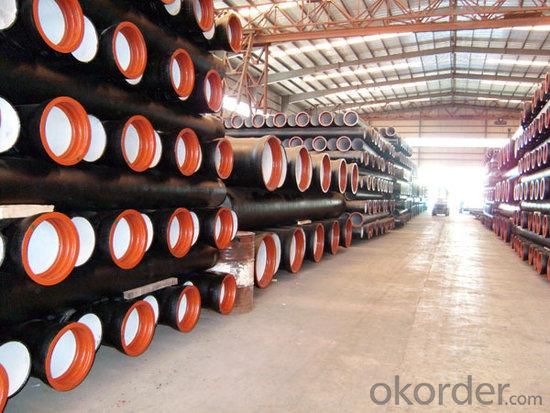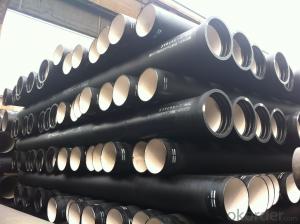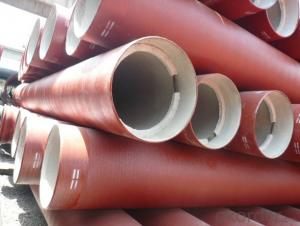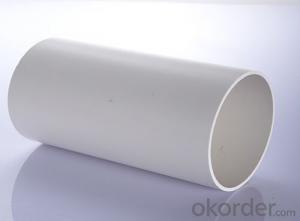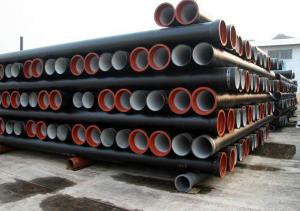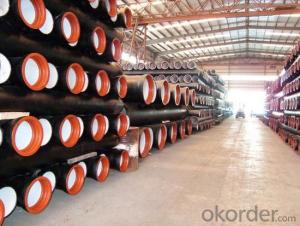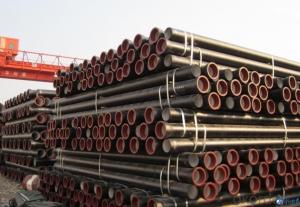Ductile Iron Pipe and Fitting DN100-800 Class30 EN545
- Loading Port:
- China main port
- Payment Terms:
- TT or LC
- Min Order Qty:
- 20 m.t.
- Supply Capability:
- 200000 m.t./month
OKorder Service Pledge
OKorder Financial Service
You Might Also Like
1,Ductile Iron Pipe Description :
1) Pipes confirm to ISO2531,K9 class,T type joint,6m long,with inside cements lining conform to ISO4179, outside Zinc spraying(130g/m2) and bitumen coating(70μm) conform to ISO8179.
2) Pipe ends: Spigot and socket ends, with 100% SBR rubber gaskets accoding to ISO4633
3) we can do third party inspection according to customer's request.
2,Main Features of the Ductile Iron Pipe:
1. Material: Ductile iron grade 500-7/ 450-10 in accordance with ISO1083
2. Standard: ISO 2531, EN545, EN598, ANSI, AWWA
3. Certificate: ISO9001, ISO14001, SGS, NSF, WRAS
4. Test: In accordance with ISO 2531 / EN 545 / EN598 and 100% water pressure test
5. Length: 6m or cut into 5.6m, 5.7m, 5.8m
6. Internal Lining: Cement, conform to ISO4179
7. Rubber: NBR, SBR, EPDM according to ISO4633 / EN681.1
3,Ductile Iron Pipe Images:
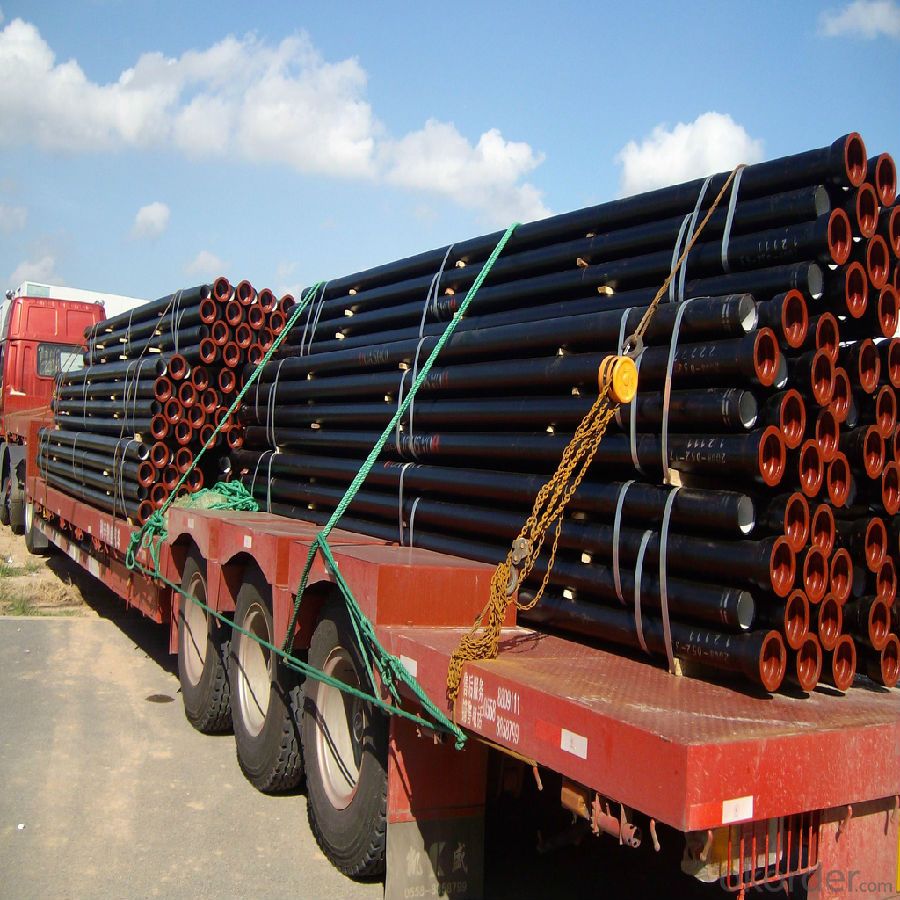
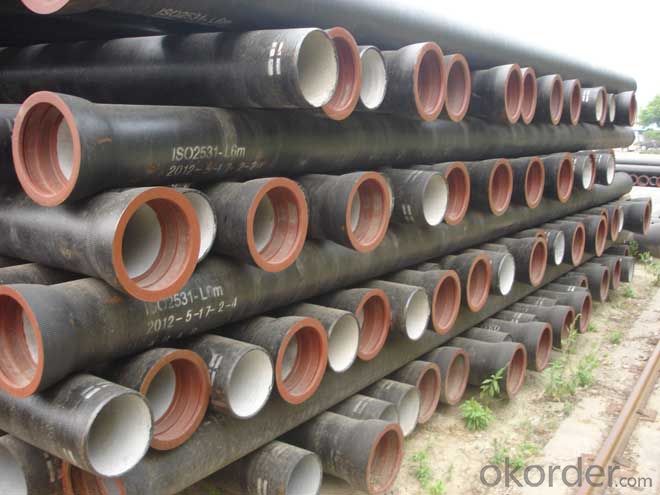
4.Ductile Iron Pipe Specification:
Internal lining: ductile iron pipes shall have an internal cement mortar lining in acc with ISO4179.
External coating: ductile iron pipes shall be externally coated with metallic zinc spray plus a further layer of resin painting to ISO8179.
Gasket: 100% SBR/NBR/EPDM rubber gasket in accordance with ISO4633.
Packing: ductile iron pipes from DN100 to DN300 be bundled with steel belts, others are in bulk.
Payment term: L/C, T/T.
5.FAQ:
We have organized several common questions for our clients,may help you sincerely:
1.Q:Why can you guarantee the inner of pipes can’t be corroded?
A: High alumina cement mortar lining and sulphate-resistant cement mortar lining. These two special linings are applicable to inner anti-corrosion for sewage pipes, improving resistance to erosion of the sewage components.
2.Q: Why would you choose ductile iron pipe rather than other pipe materials?
A:The reasons are obvious for that not only ductile iron pipe possesses the inherent strength and flexibility of ductile iron, combined with proven corrosion protection systems, but also the cost savings can be achieved from design to installation and commissioning.
- Q: What new technologies are there for the installation of ductile iron pipes?
- Type W: type W tube in the same pipe with high strength, low noise, good fireproof performance, long service life, with the characteristics of flexibility and good seismic performance, but also has synchronous construction, utilization rate is high, easy to pipe, reducing the hydraulic test of pipeline clearing times, shorten the construction period to improve economic benefits. In addition, this type of interface with bolts in the lateral fastening, avoids the defects of socket flexible interface flange is easy to damage, close to the wall to the fixed bolt, has the advantages of simple operation, so in the selection of building drainage pipes and fittings, with strong competitiveness. In addition, because the length of W pipe is 3M, the number of intermediate joints is greatly reduced, and any length can be intercepted in accordance with the requirements, thereby greatly saving the pipe material, reducing consumption and cost. W type socket with stainless steel hoop rib clamp, lined with rubber ring flexible connection, seismic performance and good sealing performance, no leakage and allowed to swing in a certain range. Therefore, W tubes are widely used both at home and abroad.
- Q: Steel plastic pipe, ductile iron pipe, steel pipe difference
- Spheroidal graphite tube, now application has been relatively small, generally used for conveying water, gas at room temperature, low pressure, large diameter pipelines need to produce concrete pipe base, good corrosion resistance than steel pipe joints, vulnerable to external extrusion and leakage, the price is relatively cheap.
- Q: What is the difference between spheroidal graphite cast iron QT400-15 and QT400-15A? What does the A mean later?
- The front is the material grade, and the back of the A should have special requirements.
- Q: How do ductile iron pipes perform in extreme weather conditions?
- Ductile iron pipes are known for their exceptional performance in extreme weather conditions. These pipes, which are made from iron alloyed with small amounts of carbon and other elements, exhibit superior strength and resilience, making them highly resistant to the effects of extreme weather. In high temperatures, ductile iron pipes maintain their structural integrity and do not soften or deform like some other materials. This ensures that the pipes continue to function efficiently and reliably, even in scorching heat. Additionally, these pipes have a high resistance to thermal expansion, which minimizes the risk of pipe distortion or joint failure during temperature fluctuations. When it comes to extreme cold, ductile iron pipes also excel. They have a low coefficient of thermal expansion, which means they are less prone to cracking or fracturing due to freezing temperatures. Moreover, their robustness and flexibility allow them to withstand the pressure exerted by freezing water inside the pipes without significant damage. Furthermore, ductile iron pipes exhibit excellent corrosion resistance, whether it be from harsh chemicals, saltwater, or other corrosive substances that may be present in extreme weather conditions. This corrosion resistance ensures the longevity and reliability of the pipes, preventing leaks and maintaining water quality. In terms of durability, ductile iron pipes are designed to withstand heavy loads and external stresses. They have a high tensile strength, making them resistant to bending and breakage. This attribute is crucial in extreme weather conditions where heavy rainfall, strong winds, or even seismic activities may occur. Overall, ductile iron pipes have a proven track record of performing exceptionally well in extreme weather conditions. Their strength, resilience, thermal stability, corrosion resistance, and durability make them a reliable choice for various applications, such as water supply, sewage systems, and industrial pipelines, even in the harshest weather environments.
- Q: Can ductile iron pipes be used for railway crossings?
- Yes, ductile iron pipes can be used for railway crossings. Ductile iron is a strong and durable material that can withstand heavy loads and high traffic volumes, making it suitable for railway crossings. Additionally, it has excellent corrosion resistance properties, which is important for withstanding the harsh environmental conditions associated with railway crossings.
- Q: How does ductile iron pipe perform in areas with high ground movement?
- Ductile iron pipe performs exceptionally well in areas with high ground movement. Its unique properties and design make it highly resistant to deformation and damage caused by ground shifting, settling, or seismic activities. The ductility of the material allows it to withstand significant stress and strain without fracturing or breaking. Unlike rigid materials such as cast iron or PVC, ductile iron pipe has the ability to flex and absorb ground movement, which prevents catastrophic failures and ensures the integrity of the pipeline system. Additionally, ductile iron pipe is manufactured with a variety of joint configurations that further enhance its performance in areas with high ground movement. Flexible joints, such as restrained joints or mechanical joints, accommodate the movement by allowing limited rotation and translation, minimizing the potential for pipe separation or joint failure. Furthermore, the robust construction of ductile iron pipe, which includes a thick wall thickness and a high tensile strength, provides additional protection against ground movement. This strength helps the pipe withstand external loads and forces induced by the ground, preventing deformation and maintaining its structural integrity. In conclusion, ductile iron pipe is an ideal choice for areas with high ground movement due to its exceptional ductility, joint flexibility, and robust construction. Its ability to absorb ground movement without compromising the pipeline system's functionality or safety makes it a reliable and durable option in such challenging environments.
- Q: What are the different types of joints used in ductile iron pipes?
- The different types of joints used in ductile iron pipes include push-on joints, restrained joints, mechanical joints, flanged joints, and welded joints.
- Q: Can ductile iron pipes be used for rainwater harvesting systems?
- Certainly, rainwater harvesting systems can utilize ductile iron pipes. Renowned for their robustness and resilience, ductile iron pipes prove to be fitting for a range of purposes, including rainwater harvesting. These pipes exhibit exceptional resistance to corrosion and are capable of withstanding considerable pressure, thereby ensuring the efficient conveyance of rainwater from the point of collection to storage tanks or distribution networks. Moreover, their impressively long lifespan diminishes the necessity for frequent replacements, rendering them a cost-effective option for rainwater harvesting systems.
- Q: Can ductile iron pipes be used for underground hydropower systems?
- Indeed, underground hydropower systems can utilize ductile iron pipes. Renowned for their robustness and endurance, ductile iron pipes are apt for a wide range of purposes, including subterranean installations. With remarkable resistance against corrosion and the ability to withstand intense pressure, they are exceptionally suited for transporting water in hydropower systems. Furthermore, ductile iron pipes boast a lengthy lifespan, diminishing the necessity for frequent replacements and reducing maintenance expenses. Moreover, they exhibit excellent joint integrity, guaranteeing leak-free connections beneath the surface. Thus, ductile iron pipes emerge as a dependable option for underground hydropower systems.
- Q: Can ductile iron pipes be used for stormwater drainage systems?
- Yes, ductile iron pipes can be used for stormwater drainage systems. Ductile iron pipes are known for their strength, durability, and corrosion resistance, making them suitable for various applications, including stormwater drainage. They can handle high volumes of water flow and withstand heavy traffic loads, making them a reliable choice for stormwater management. Additionally, ductile iron pipes have excellent joint performance, ensuring a watertight and secure connection, which is crucial for preventing leaks and maintaining the integrity of the stormwater drainage system. Overall, ductile iron pipes are a viable option for stormwater drainage systems due to their robustness, longevity, and ability to withstand the harsh conditions often associated with stormwater management.
Send your message to us
Ductile Iron Pipe and Fitting DN100-800 Class30 EN545
- Loading Port:
- China main port
- Payment Terms:
- TT or LC
- Min Order Qty:
- 20 m.t.
- Supply Capability:
- 200000 m.t./month
OKorder Service Pledge
OKorder Financial Service
Similar products
Hot products
Hot Searches
Related keywords
